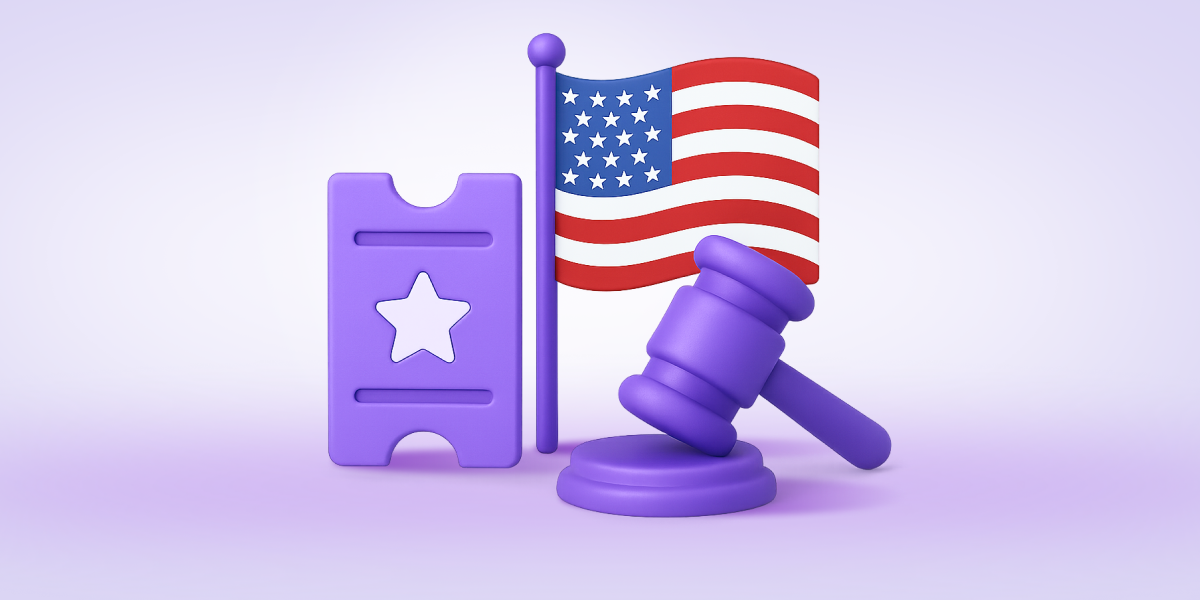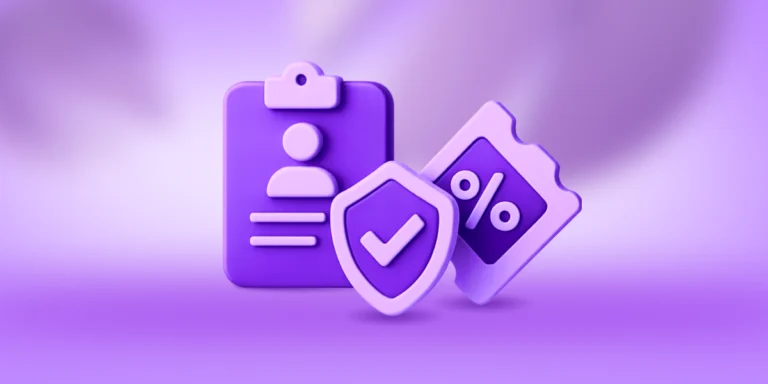Sweepstakes Laws by State: Legal But Not Simple

Sweepstakes are legal in the US, but the situation is far from simple: you’ll face 50 different versions of what compliance means in this context. Specific laws apply in each state, and understanding them is now a must for iGaming operators. Because you can’t scale legally if you don’t know where you’re blocked.
A solid marketing idea and prizes are not enough to run a contest in 2025: that’s the hard truth. What you primarily need is 50 sets of iGaming regulations to follow. Your operating plan should outline how players can join for free, what rules apply, and what terms they agree to in every region.
Sweepstakes Laws in Quick Facts
Sweepstakes Laws in Quick Facts
As emphasized by NuxGame COO Denis Kosinsky in the iGaming Expert article, the time to enter the US sweepstakes market is now. He explains that while growth is strong, regulation is catching up fast — and only operators who work on legally compliant, engaging systems will stay competitive.
This article explores US contests and sweepstakes laws by state and provides useful tips for ambitious casino operators looking to make the most of the NuxGame Sweepstakes Casino Software platform. Keep reading to learn more or just contact us today to see how our team can help you launch fast!
What Makes Sweepstakes Legal?
Getting to grips with what sweepstakes casinos are (at least legally) comes down to one major difference: players don’t have to pay. That’s why every legal sweepstakes includes an AMOE — a free way to enter. This is the main requirement under US law, separating sweepstakes from real-money gambling.
The other major difference is randomness. A sweepstakes offering must be based on chance vs skill; also, your service must detail in its official rules how players enter for free, how winners are picked, and when prizes are distributed.
Still, the real challenge is that state laws and regulations differ. Some are strict, others vague, and most require careful wording to adhere to promotion law. Operators who rely on generic platforms risk exposure, while those using proper sweepstakes API integration stay protected at the system level.
Don’t underestimate how quickly state laws transform. A promotion that’s legal today may become restricted within a quarter. That’s why we recommend that every operator set up real-time legal monitoring: either in-house or via partner tools. Following legal updates closely is now part of the sweepstakes growth strategy. It protects your investment and your players.

Denis Kosinsky
Chief Operating Officer at NuxGame
Sweepstakes Laws by State: 50 Legal Realities Within One Country
The US sweepstakes and contest model runs on a fine balance: it’s legal at the federal level, but only when structured correctly (and not everywhere equally). Sweepstakes are allowed under federal laws regarding prize-based promotions. However, the way sweepstakes are offered is dependent heavily on state-specific rules. This has become a serious concern for iGaming operators who want fast expansion without legal issues. From entry methods to prize values, sweepstakes rules and compliance can change dramatically from one state to the next. Keep reading to get the gist of where you’re greenlit — and where caution or full geoblocking is required.
Best US States to Launch a Sweepstakes Casino in 2025
We will now dwell upon the states that allow sweepstakes and contest activity, but only under specific conditions. Operators must meet sweepstakes regulations, which often involve providing a free entry option, declaring prize terms in official rules, and in some cases being registered with the state. These markets offer some of the best opportunities for legal and scalable growth, especially for operators using trusted B2B solutions in iGaming to manage risk and speed up market entry.
Let’s now talk about the states that are open for business, and the conditions that apply in each one:
- Contests and Sweepstakes in Texas. Texas permits sweepstakes offered for promotional purposes, but only when they follow defined legal conditions. Promotions must not combine chance, prize, and payment: this violates gambling laws. A free entry option is mandatory, and promotional materials must state official rules, prize values, and eligibility terms. If operating nationally, always verify the laws in your state. See Texas Business and Commerce Code Chapter 622 for more information.
- Sweepstakes Casinos in California. California allows you to organize a contest or sweepstakes, provided you don’t require a purchase for participation. Your promotion should feature a visible free-entry option and state in the official rules how the entry, selection, and prize process are managed. A purchase requirement may bring your campaign under the state’s gambling laws. California also has strict rules on how you present promotions: exaggerated prize claims or “guaranteed win” messaging are not allowed. See California Business and Professions Code, Section 17539.15 for more information.
- Contests and Sweepstakes in Indiana. Indiana allows companies to offer a contest or sweepstakes, but only if they satisfy the main requirement of free participation (meaning no purchase is needed for entry) and the outcome is based on chance or skill according to structure. Operators must guarantee that sweepstakes winners are chosen fairly and that all disclosures are in the official rules.
- Contests and Sweepstakes in Ohio. You can legally enter a sweepstakes scene in Ohio only if payment is not part of the process. Therefore, any sweepstakes that suggest purchase or payment will be considered prohibited for sweepstakes under state law. The main requirement: provide free entry and publish full official rules detailing winner selection and prize terms. Unlike Texas and Indiana, Ohio also requires registration for certain device‑based promotions and is drafting legislation to further regulate sweeps‑casino style offers.
- Contests and Sweepstakes in Georgia. You can operate a sweepstakes or contest service in Georgia if you meet the main requirements for sweepstakes, which prohibit entry fees or payments tied to chance. Georgia’s purchase necessary laws are strict, and combining payment with random prize selection can be treated as illegal gambling. Unlike Texas, the focus here is not solely disclosure but full avoidance of gambling-like systems. The state enforces its laws through lottery and consumer agencies, so operators should go the extra mile to make sure that their sweepstakes remain promotional and never resemble a wagering product. See Georgia Code, Section 16‑12‑36 for more details.
US States With Vague Sweepstakes Laws
Sweepstakes laws in the states below are not defined in a forthright manner. This makes legal compliance more difficult for operators. While technically allowed, many choose to block users in these states to avoid potential legal issues:
- Contests and Sweepstakes in Kentucky. The legal status of promotional sweepstakes or contest activity remains uncertain. Gambling laws here prohibit schemes combining consideration, chance and prize, which means promotions may be blocked if they appear too close to a lottery. See KRS, Section 528.010–528.110 for details. The state lacks a higher‑level regulatory framework for sweepstakes, unlike Georgia or Ohio. As a result of this legal ambiguity, many operators choose not to target the state until more defined rules emerge.
- Contests and Sweepstakes in Louisiana. Louisiana does not have a dedicated law allowing private sweepstakes casinos, and its contest laws are among the toughest in the US. Any promotion that comes with chance, prize, and payment is considered gambling under state law. See Louisiana Revised Statutes Title 14, Sections 90–90.5 for more information. The state provides no licensing or registration option for prize‑based sweepstakes, and there’s no safe way to run a campaign with the state involving monetary rewards.
Where You Can’t Legally Operate Sweepstakes Casinos in the US
| State | Limitation Type | Main Reason |
|---|---|---|
| Connecticut | Full ban | State law directly prohibits sweepstakes casino models |
| Idaho | Not allowed with payment | Any paid entry is seen as gambling |
| Michigan | License needed | Only licensed gambling operators can run prize-based promotions |
| Montana | Online sweepstakes banned | Internet-based prize games are not allowed |
| Nevada | Full gambling license needed | Sweepstakes treated like casino gambling; full license required |
| New York | Restricted by rules | Licensing required; casino-style sweepstakes models not accepted |
| New Jersey | Casino license required | Only licensed casinos may offer sweepstakes with prizes |
| Tennessee | Strong gambling restrictions | No allowance for prize-based chance games |
| Washington | Internet sweepstakes illegal | Online sweepstakes are seen gambling under state law |
| West Virginia | Undefined regulation | No specific law to support sweepstakes casinos |
The information in this article does not replace legal advice. Sweepstakes regulations are different in each state and change all the time, therefore, operators should seek direct guidance from iGaming legal services for verification.
Expert Tips for Legal Sweepstakes Casino Operation
If you’re managing sweepstakes in New Hampshire or preparing new campaigns for sweepstakes in New Mexico, compliance must be integrated into every stage. And no matter the location, your online casino customer support must know how to explain the basics: what’s free, what’s chance, and what’s required by law.
We’ve shared some useful tips for sweepstakes online casino operators from our experts below:
Operators planning any giveaway or sweepstakes should remember that some states demand you must register with the state; others simply apply federal and state laws without direct control. The only safe route is transparency. Operators expanding from online gambling in Canada should expect US laws to be tougher — but also more rewarding when dealt with in a wise, well-informed way.
The Future of US Sweepstakes Laws
The US sweepstakes space is changing. States that now block sweepstakes casinos may soon allow them under tighter rules. That means now is the time to prepare, especially if your business uses crypto casino software or advanced loyalty systems. A skill-based contest may help avoid gambling classifications today, but the laws aren’t clear when AI selects prizes or bonuses change based on player behavior. In these cases, regulators are rethinking sweepstakes vs gambling models. Some contests may now need to register with the state, especially when offering high-value prizes or crypto-linked rewards.
These changes will influence how you design your campaigns. Following updates to contest laws by state is now paramount. And now that more states introduce strict identity rules, we recommend that you plan for rising legal focus on ID verification in iGaming. The legal picture is still forming, but opportunity favors success-driven and future-forward operators who act early.
Conclusion
Planning to offer contests and sweepstakes in Illinois? Launching sweepstakes in New York or Michigan? You need to understand right from the start both how to engage your players and how to protect your business. Success in 2025 depends on knowing exactly what’s legal where you operate. Operators who prepare now will grow faster and safer than those who wait. Make compliance part of your foundation and start your project with iGaming software from NuxGame. Contact us to create your fully legal sweepstakes online casino today!

